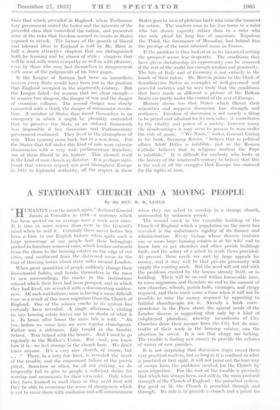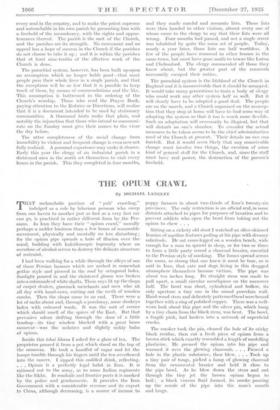A STATIONARY CHURCH AND A MOVING PEOPLE By the REV.
R. D. LLOYD "HUMANITY is on the march again," declared General Smuts at Versailles in 1918—a sentence which has been quoted on an average once a week ever since. It is true in more senses than were in the General's mind when he said it. Certainly there never before has been a time in our English history when quite such a large percentage of our people • had their belongings packed in furniture removal vans, which lumber outwards from the slums to the housing estates on the edge of our cities, and southward from the distressed areas to the ring of thriving towns about sixty miles around London.
When great quantities of people suddenly change their immemorial habits, and betake themselves in the mass to new surroundings, the cracks in the institutions around which their lives had been grouped, and in which they had lived, are revealed with a disconcerting sudden- ness. Of such institutions, none is having a more difficult time as a result of this mass migration than the Church of England. One of the serious cracks in its system has certainly been revealed. A single iafternoon's visiting on any housing estate leaves one in no doubt of what it is. In house after house the same tale is told. "Aim yes, before we came here we were regular churchgoers. Father was a sidesman. Lily taught in the Sunday School. • Tom helped with the Scouts. • And I used to go regularly to the Mother's Union. But—well, you know how it is—we feel strange in the church here. We don't know anyone: It's a very nice church, of course, but . ." There, in a very few lines, is revealed the heart of the trouble, and the commonest failure of the parish priest. Somehow or other, for all our striving, we do frequently fail to give to people a sufficient desire for worship and sacraments for their own sake Only when they have learned to need them as they need food will they be able to overcome 'the sense of strangeness which is apt to cover them with confusion and self-consciousness when they are asked to worship in a strange church, surrounded by unknown people.
The second crack in the venerable building of the Church of England which a population on the move has revealed is the unfortunate rigidity of its finance and administration. Every bishop whose diocese contains one or more large housing estates is at his wits' end to know how to get churches and other parish buildings built, and the salary of a priest to work there provided. At present, these needs are met by • large appeals' for money, and it may well be that private generosity will supply the existing need. But the need will not end with the problems created by the houses already built, or in building. There will be no end within foreseeable time, to mass migration, and therefore no end to the amount of new churches, schools, parish halls, vicarages, and clergy. required, and there must come a time when it will not be possible to raise the money required by appealing to faithful churchpeople for it. Already a brisk corre- spondence in the Press about the special needs of the London diocese is suggesting that only by a kind of enlightened pluralism, whereby incumbents of City Churches draw their income from the City but do nine- tenths of their work in the housing estates, . can the situation be saved. It is not that clergy are lacking. The trouble is finding new money to provide the salaries of vicars of new parishes.
It is not surprising that discussion rages round these very practical matters, but as long as it is confined to what is practical at first sight, it will not point out the true way of escape from the problems created for the Church by' mass migration. For the root of the trouble is precisely : that which has always been, and still is, the main pastoral strength of the Church of England—the parochial system. For good or ill, the Church is parochial through and through.' It's rule is to provide a church and a priestfor every. soul in the country, and to make the priest supreme and untouchable in his own parish by presenting him with a freehold of the incumbency, with the rights and appur- tenances thereof. The parish is the unit of the Church, and the parishes are its strength. No movement and no appeal has a hope of success in the Church if the parishes do not choose to take it up ; and it is within the parishes that at least nine-tenths of the effective work of the Church is done.
The parochial system, however, has been built up upon an assumption which no longer holds good—that most people pass their whole lives in a single parish, and that the exceptions will be so few that it is possible to keep track of them, by means of commendations and the like. This assumption is buttressed in the ordering of the Church's worship. Those who read the Prayer Book, paying attention to the Rubrics or Directions, will realise that it is a document intended to be used by stationary communities. A thousand hints make that plain, and notably the injunction that those who intend to communi- cate on the Sunday must give their names to the vicar the day before.
The utter completeness of the social change from immobility to violent and frequent change is even now not fully realised. A personal experience may make it clearer. Early this year the clergy of an industrial parish in a distressed Area in the north set themselves to visit every house in the parish. This they completed in four months, and they made careful and accurate lists. These lists were then handed to other visitors, almost every one of whom came to the clergy to say that their lists were all wrong. Four months had passed, and not a single street was inhabited by quite the same set of people. Today, nearly a year later, those lists arc half worthless. A few of the people have removed to other houses in the same town, but most have gone south to towns like Luton and Chelmsford. The clergy commended all those they knew about, but the greater part of the removals necessarily escaped their notice.
The parochial system is the lifeblood of the Church in England and it 'is inconceivable that it should be scrapped. It would take many generations to train a body of clergy who could work any other system half as well. But it will clearly have to be adapted a good deal. The people arc on the march, and a Church organised on the assump-• tion that they stop at home will have to find some way of adapting the system so that it too is much more flexible. Such an adaptation will necessarily be illogical, but that will disturb no one's slumber. To consider the actual measures to be taken seems to be the chief administrative need of the Church at present. ' Their details no one can foretell. But it would seem likely that any conceivable change must involve two things, the creation of sonic kind of general staff for the Church, and, since the staff must have real power, the destruction of the parson's freehold.



































 Previous page
Previous page